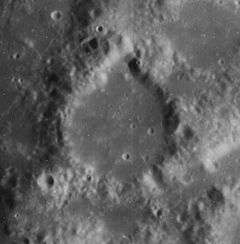Littrow
|
Lunar Orbiter 4 image | |
| Coordinates | 21°30′N 31°24′E / 21.5°N 31.4°ECoordinates: 21°30′N 31°24′E / 21.5°N 31.4°E |
|---|---|
| Diameter | 31 km |
| Depth | 1.2 km |
| Colongitude | 329° at sunrise |
| Eponym | Joseph Johann Littrow |
Littrow is a lunar crater that is located in the northeastern part of the Moon's near side, on the east edge of Mare Serenitatis. Some distance to the northeast is the prominent crater Römer, while to the south is Vitruvius.
The rim of Littrow is heavily worn and eroded, especially along the southern wall. The interior has been flooded with lava in the past, leaving a relatively smooth, featureless surface with no central rise.
Rimae Littrow
Just to the northwest of Littrow is a system of rilles designated the Rimae Littrow. These are located at selenographic coordinates 22.1° N, 29.9° E, and have a maximum diameter of 115 km. To the south-southwest is the Taurus-Littrow valley that is notable for being the landing site of the Apollo 17 mission. Two tiny craters to the west of this site have been assigned names by the IAU. These are listed below.
| Crater | Longitude | Latitude | Diameter | Name source |
|---|---|---|---|---|
| Ching-Te | 20.0° N | 30.0° W | 4 km | Chinese masculine |
| Stella | 19.9° N | 29.8° W | 1 km | Latin feminine |
Satellite craters
By convention these features are identified on lunar maps by placing the letter on the side of the crater midpoint that is closest to Littrow.
| Littrow | Latitude | Longitude | Diameter |
|---|---|---|---|
| A | 22.2° N | 32.2° E | 23 km |
| D | 23.7° N | 32.8° E | 8 km |
| F | 22.0° N | 34.1° E | 12 km |
| P | 23.2° N | 32.8° E | 36 km |
The following craters have been renamed by the IAU.
- Littrow B — See Clerke (crater).
References
- Andersson, L. E.; Whitaker, E. A. (1982). NASA Catalogue of Lunar Nomenclature. NASA RP-1097.
- Blue, Jennifer (July 25, 2007). "Gazetteer of Planetary Nomenclature". USGS. Retrieved 2007-08-05.
- Bussey, B.; Spudis, P. (2004). The Clementine Atlas of the Moon. New York: Cambridge University Press. ISBN 978-0-521-81528-4.
- Cocks, Elijah E.; Cocks, Josiah C. (1995). Who's Who on the Moon: A Biographical Dictionary of Lunar Nomenclature. Tudor Publishers. ISBN 978-0-936389-27-1.
- McDowell, Jonathan (July 15, 2007). "Lunar Nomenclature". Jonathan's Space Report. Retrieved 2007-10-24.
- Menzel, D. H.; Minnaert, M.; Levin, B.; Dollfus, A.; Bell, B. (1971). "Report on Lunar Nomenclature by the Working Group of Commission 17 of the IAU". Space Science Reviews. 12 (2): 136–186. Bibcode:1971SSRv...12..136M. doi:10.1007/BF00171763.
- Moore, Patrick (2001). On the Moon. Sterling Publishing Co. ISBN 978-0-304-35469-6.
- Price, Fred W. (1988). The Moon Observer's Handbook. Cambridge University Press. ISBN 978-0-521-33500-3.
- Rükl, Antonín (1990). Atlas of the Moon. Kalmbach Books. ISBN 978-0-913135-17-4.
- Webb, Rev. T. W. (1962). Celestial Objects for Common Telescopes (6th revised ed.). Dover. ISBN 978-0-486-20917-3.
- Whitaker, Ewen A. (1999). Mapping and Naming the Moon. Cambridge University Press. ISBN 978-0-521-62248-6.
- Wlasuk, Peter T. (2000). Observing the Moon. Springer. ISBN 978-1-85233-193-1.
External links
- LTO-43D1 Littrow — L&PI topographic map
